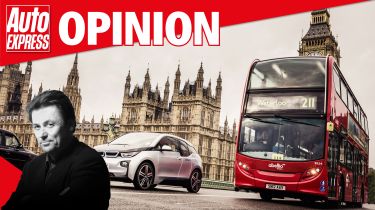'It's time to replace buses with more appropriate vehicles'
Mike Rutherford thinks Britain needs to overhaul its buses

Surprise, surprise, buses are losing their appeal. Up to 30 per cent of services are in danger of going under. So what the hell is Britain to do about the archaic beast that is the traditional British bus?
First, let’s acknowledge that over the decades, most buses have changed little, remained noisy, filthy, costly and hideously large. Honestly, do we really need ageing, intimidating double-deckers in small to medium-sized towns and villages? It’s time to replace them with smaller, more appropriate and fuel-efficient vehicles – ‘community cars’ included.
If you’ve already worked out that standing on a windswept railway platform is misery, try the even more torturous process of languishing at a bus stop on a cold, dark, wet morning or night. It’s the pits. Soul destroying. There has to be a better way. And there is.
The gap between the quality, comfort and 24/7 convenience of a car, versus the daily grind of being a piece of human cargo on a bus (assuming one eventually turns up) has never been greater. The car industry isn’t perfect, but it’s massively raised its game in terms of quality and desirability of product. To be fair, the taxi, train, airline and cycling sectors have all moved with the times, too.
But the bus business? It needs reinventing. It can’t be right that when you venture only a few miles from any large town or city, you’ll discover that there may only be four buses a day.
Bus companies, the UK Government and local authorities all need to ask themselves whether it’s right and proper for taxpayers’ money to be spent on this, and more pertinently, decide whether there’s a better way.
At the same time, the Confederation of Passenger Transport (official slogan: “What we do? We influence governments”) needs to think about what it says. For example, in a national broadcast a few days ago, it claimed “the car should be the journey of last resort”. Says who, exactly? On what grounds? Rarely have I heard a trade organisation so pathetically try to convince drivers and passengers to leave their bought and paid for motor at home and use coaches or buses instead. It’s such a shallow, biased and unconvincing demand to make.
And the car-hating confederation goes from bad to worse when it claims “a 15 per cent increase in coach journeys each year could lead to approximately 47 million fewer cars on the road”. How come, when we only have 30-odd million cars to begin with?
In rural areas at least, the case for abandoning buses and replacing them with more reliable, comfortable and smaller vehicles has never been stronger. If every village or small town had at least one affordable (sub-£15,000), seven-seat, state-of-the-art Dacia Jogger and a local driver or two assigned to it, there could be flexible, reasonably priced, pre-booked, door-to-door car travel for everyone. All that government cash buys an awful lot of Joggers.
So, in with this locally focused type of car-based public transport system operating door to door, out with the tired, tatty buses, vandalised bus stops and greedy bus entrepreneurs in those plush corporate offices that rake in a fortune in questionable state aid.
Check out the best seven-seat cars on sale here...
Find a car with the experts




